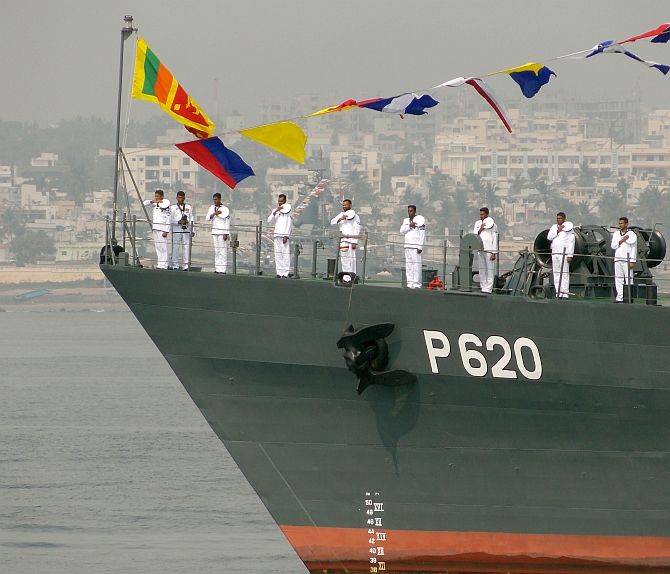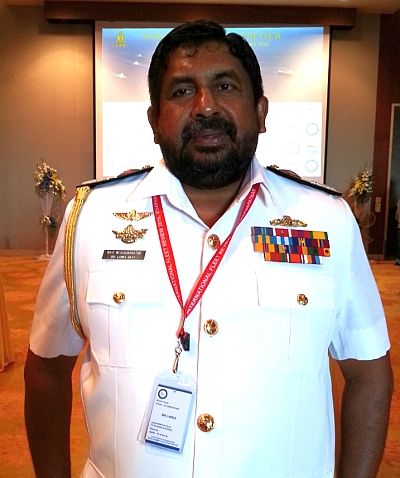'Investment is the only way India can counter the Chinese influence in the region.'
'With more and more investments, you will have more and more stake; the strategic importance of Sri Lanka can be fulfilled with investments.'
'Investments should come because the void which is created by investments is always going to be filled by Chinese companies.'
"Our relationship is very close. There's only one irritant between our countries, and we believe it can be resolved amicably," Vice Admiral Ravindra Wijegunaratne, commander of the Sri Lankan navy, tells Rediff.com's Vipin Vijayan.

How have India-Sri Lanka ties evolved in the last few years?
We have very close ties with the Indian Navy and Indian Coast Guard, as we have a common border.
Almost 90 per cent of our training is done by the Indian Navy.
So, I can say that our relationship with the Indian Navy is like that of Guru-Shishya.
Our navies do joint exercises -- Operation Slinex -- every year.
Indian naval ships visit Sri Lanka very frequently.
In fact, the Indian Navy's new aircraft carrier, INS Vikramaditya, made its first port call to Colombo on its way to Visakhapatnam.
While all is hunky-dory, there have been some irritants in the relationship as well.
The issue pertaining to the frequent arrest of Indian fishermen and reports of their mistreatment by the Sri Lankan authorities.
The fishermen issue is something both countries have to work very closely together.
Our issue is not with the fishermen crossing the maritime boundary, but their method of shipping.
All these trawlers that are coming into our waters do bottom trawling, which destroys the environment and sea life.
(Bottom trawling is an industrial fishing method where a large net with heavy weights is dragged across the sea floor, scooping up everything in its path -- from fish to incidentally caught centuries-old corals.)
Bottom trawling threatens corals, small fish, fish eggs, sea weeds... everything gets destroyed.
So that is the concern we have.
We have indicated that at the highest level and discussed.
Whenever the Indian fishermen are caught by our coast guard and by our navy, we look after them very well because we understand that it is a matter of their livelihood.
But at the same time, the Sri Lankan navy faces tremendous pressure from our own fishermen. Since the time the conflict (with the Liberation Tigers of Tamil Eelam) ended, they too have been venturing into the seas, trying to rebuild their lives.
So they face this problem of big (Indian) trawlers moving in and taking over the fish stock.
Our major concern is this bottom trawling. We have to stop that.
At what stage are the negotiations?
There are very high level talks going on between the two governments.
At the same time, the ministries that handle fishing are talking.
And there is another forum where fishermen of the two countries have been discussing this matter. There are certain agreements which came up. These are being implemented.
I know the Tamil Nadu government is trying to give them support to convert their (the Indian fishermen) trawlers into deep sea fishing boats, which is a very important move.
Even Sri Lanka can help in that transformation as we have a fairly large deep sea fleet which goes for tuna fishing in the Indian Ocean.
That's a very profitable fishing method.
Our relationship is very close. There's only one irritant between our countries, and we believe it can be resolved amicably.

New Delhi has been expressing concern over growing Chinese activity around Sri Lanka.
After the new (Mathripala Sirisena) government came to power, it have showed to the world community, especially to India, how it is going to work.
The Chinese are one of the biggest investors in Sri Lanka.
At the same time, as the chief of the Sri Lankan navy, I can assure that India's security will never be compromised by any action of the Sri Lankan government.
Could you please elaborate?
Sri Lanka needs more and more investments.
There are very big Indian companies that are investing and can invest in Sri Lanka.
For example, for the second phase of the Hambantota harbour, there are almost 11 Indian companies which are going to invest.
This is the only way you (India should counter (the Chinese influence in the region).
With more and more investments, you will have more and more stake; the strategic importance of Sri Lanka can be fulfilled with investments.
Investments should come because the void which is created by investments is always going to be filled by Chinese companies.
Besides investments, how else can India make a difference in the Indian Ocean?
As a maritime nation, India has been doing a wonderful job.
Especially to the smaller countries like Sri Lanka, the Maldives, the Seychelles and Mauritius, who look up to India for support.
We (Sri Lanka) can never forget the disaster relief we received from the Indian government and its navy during the December 2004 tsunami. They reacted fast and saved thousands of lives in our country.
India is looking after the smaller nations. We have a trilateral maritime agreement between India, Sri Lanka and the Maldives.
We are going to expand it to two more nations -- Mauritius and the Seychelles.
So this will have a very big impact on our countries and in the Indian Ocean.
At the same time, we have a lot of information sharing methods.
We meet regularly at the national security advisor level and the deputy NSA level.
So, I guess, India is on the right track.
It has the confidence of the smaller nations in the Indian Ocean with regard to their safety and security.










 © 2025
© 2025